Millions of people from around the globe undertake Umrah and Hajj pilgrimages to the Kingdom of Saudi Arabia each year. These mass gatherings present unique public health challenges, including the potential for the spread of infectious diseases.
Purpose and scope
To help ensure the safety of pilgrims, this page outlines key health practices for preventing conditions of concern. It includes general recommendations, such as:
carrying detailed medical documentation and sufficient medication.
specific measures for preventing respiratory infections, food and waterborne and heat-related conditions.
It also addresses vector-borne diseases like Zika virus and dengue fever and outlines how international health events will be managed.
The page provides key health messages for travellers before, during and after their pilgrimage, based on the most recent risk assessments and global epidemiological situation. While the page aims to support the Ministry of Health of Saudi Arabia in promoting pilgrim safety, it is important to note that the Saudi Ministry of Health has specific vaccination requirements and other detailed regulations. Pilgrims should refer to the Ministry of Health website (www.moh.gov.sa) for the most up-to-date and comprehensive information.
The goal is to ensure the health and safety of all pilgrims by promoting awareness, encouraging adherence to preventative measures and facilitating timely access to health care services. By working together, we can protect the health of pilgrims and minimize the risk of infectious disease outbreaks.
Vaccination
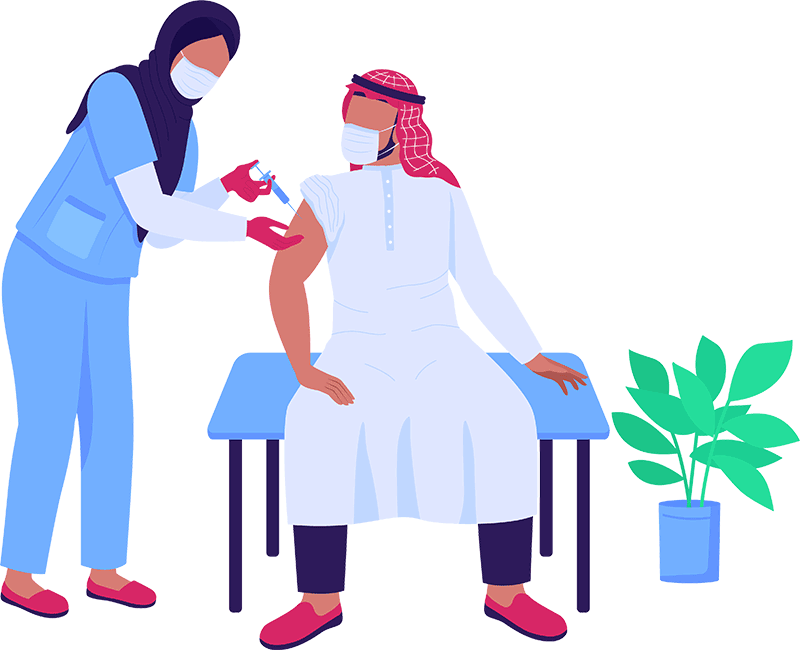 The Kingdom of Saudi Arabia implements stringent preventative measures, including mandatory pre-travel vaccination requirements. Currently, these include vaccination against:
The Kingdom of Saudi Arabia implements stringent preventative measures, including mandatory pre-travel vaccination requirements. Currently, these include vaccination against:
meningococcal meningitis
poliomyelitis (for travellers from affected countries)
yellow fever (for travellers from risk areas).
The Saudi Ministry of Health also recommends vaccination against:
SARS-CoV-2 (COVID-19)
seasonal influenza
poliomyelitis for travellers from states reporting positive cVDPV2 environmental samples.
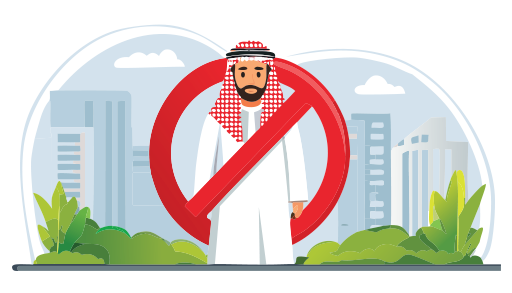 A significant number of pilgrims enter Saudi Arabia on visas not specifically for Umrah or Hajj, such as tourist or business visas, and then proceed to perform the pilgrimage. This makes pre-travel vaccination verification challenging and increases the risk of international disease spread. Risks are further compounded by variations in the prevalence of disease in pilgrims' countries of origin, the potential for transmission from asymptomatic carriers, increased travel during peak seasons such as Ramadan, and issues around vaccination compliance and certificate authenticity.
A significant number of pilgrims enter Saudi Arabia on visas not specifically for Umrah or Hajj, such as tourist or business visas, and then proceed to perform the pilgrimage. This makes pre-travel vaccination verification challenging and increases the risk of international disease spread. Risks are further compounded by variations in the prevalence of disease in pilgrims' countries of origin, the potential for transmission from asymptomatic carriers, increased travel during peak seasons such as Ramadan, and issues around vaccination compliance and certificate authenticity.
Messages for travellers: pre-travel
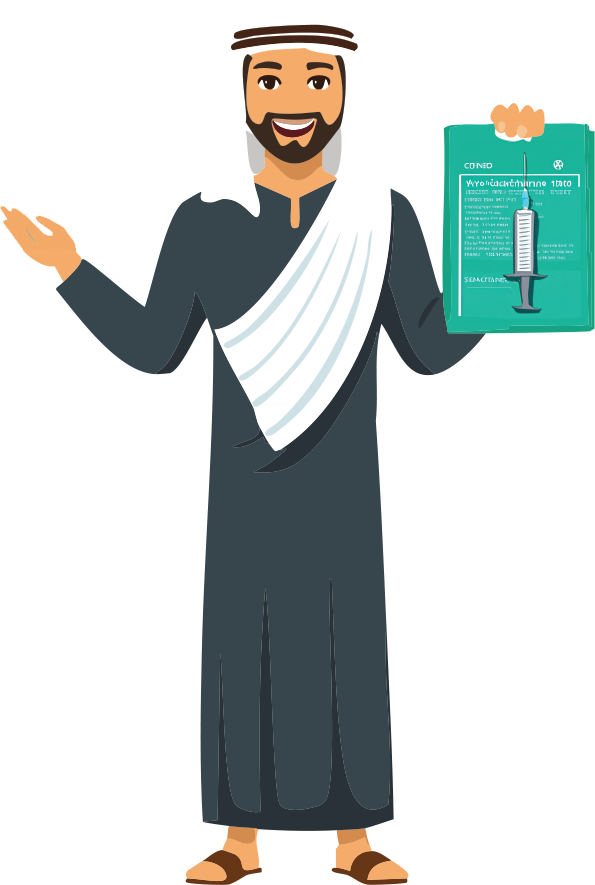 » Target behaviour
» Target behaviour
That travellers preparing for Umrah or Hajj understand the health risks, take necessary precautions and comply with vaccination requirements.
» Communication objectives
To ensure travellers:
are aware of the potential health risks during Umrah and Hajj;
understand the importance of pre-travel vaccinations and other preventive measures; and
take proactive steps to protect themselves and others from illness.
» Key message
Before travelling for Umrah or Hajj, take the necessary steps to protect your health and the health of others.
» Supporting messages
What health measures should you take before travelling for Umrah and Hajj?
To protect your health and the health of others the following steps are recommended:
be aware of potential health risks and take preventive measures before your trip;
ensure you are up to date on all required and recommended vaccinations, as specified by the Saudi Ministry of Health (www.moh.gov.sa);
consult your doctor about any pre-existing health conditions and carry sufficient supplies of any necessary medications in their original packaging;
carry documentation detailing any chronic medical conditions;
ensure you are up to date with routine immunizations, including diphtheria, tetanus, pertussis, poliomyelitis, measles, mumps and chickenpox; and
adhere to general health recommendations such as maintaining good hygiene practices.
What vaccinations are required/recommended?
The Kingdom of Saudi Arabia mandates certain pre-travel vaccinations for all eligible travellers arriving for Umrah and Hajj. These include vaccines against:
Meningococcal meningitis
All travellers aged 1 year and older, from all countries, must receive a quadrivalent meningococcal vaccine (a vaccine that protects against 4 types of meningococcal bacteria). The vaccine must be administered within the specified validity period and at least 10 days before arrival.
Poliomyelitis
Travellers from countries reporting cases of poliovirus must receive at least 1 dose of either bivalent oral polio vaccine (a vaccine containing 2 types of poliovirus) or inactivated polio vaccine (a vaccine containing killed poliovirus).
Yellow fever
Travellers older than 9 months from countries at risk of yellow fever transmission must receive the yellow fever vaccine. The yellow fever vaccination certificate is valid for life, starting 10 days after vaccination.
The Saudi Ministry of Health also recommends that travellers intending to perform Umrah or Hajj receive vaccines against:
COVID-19;
Seasonal influenza; and
Poliomyelitis, for travellers from countries where poliovirus has been found in sewage or other environmental samples.
The Saudi Ministry of Health approves specific types of vaccines for entry into the Kingdom. Travellers must ensure they receive a Saudi Ministry of Health-approved vaccine and that their vaccination certificate:
is issued by the health authority in their country of origin;
clearly indicates the name, type and date of administration of the vaccine; and
is valid according to Saudi Ministry of Health regulations.
It is important to note that many travellers enter Saudi Arabia on visas not specifically for Umrah or Hajj (e.g. tourist or business visas) and then proceed to perform the pilgrimage. To comply with Saudi health regulations and protect your health and the health of others, ensure you meet all vaccination requirements even if you are not travelling on a specific pilgrimage visa.
Check the latest requirements on the official website of the Saudi Ministry of Health (www.moh.gov.sa).
What health measures are in place at points of entry in Saudi Arabia?
Upon arrival in Saudi Arabia, health authorities may implement several health measures at points of entry. These may include:
administering preventive antibiotics for meningitis to travellers from countries with frequent meningitis outbreaks or increased risk;
administering a dose of oral polio vaccine to travellers from countries reporting cases of poliovirus, regardless of age and vaccination status;
verifying that your travel documents include a valid certificate proving that measures have been taken to control insects, rodents and other disease-carrying organisms, as per International Health Regulations (an agreement with countries to prevent the international spread of infectious diseases); and
conducting health screenings and assessments for symptoms such as diarrhoea and administering preventive therapy if needed, especially for travellers from countries affected by cholera outbreaks.
How can you prevent respiratory infections?
To minimize the risk of respiratory infections, which can easily spread in crowded settings, you should:
wash your hands frequently with soap and water or use a disinfectant, especially after coughing or sneezing;
use disposable tissues when coughing or sneezing and dispose of used tissues in a wastebasket;
wear a regular face mask in crowded places;
avoid close contact with people who appear ill and refrain from sharing their personal belongings; and
avoid contact with camels in farms, markets or barns.
Messages for travellers: during travel
» Target behaviour
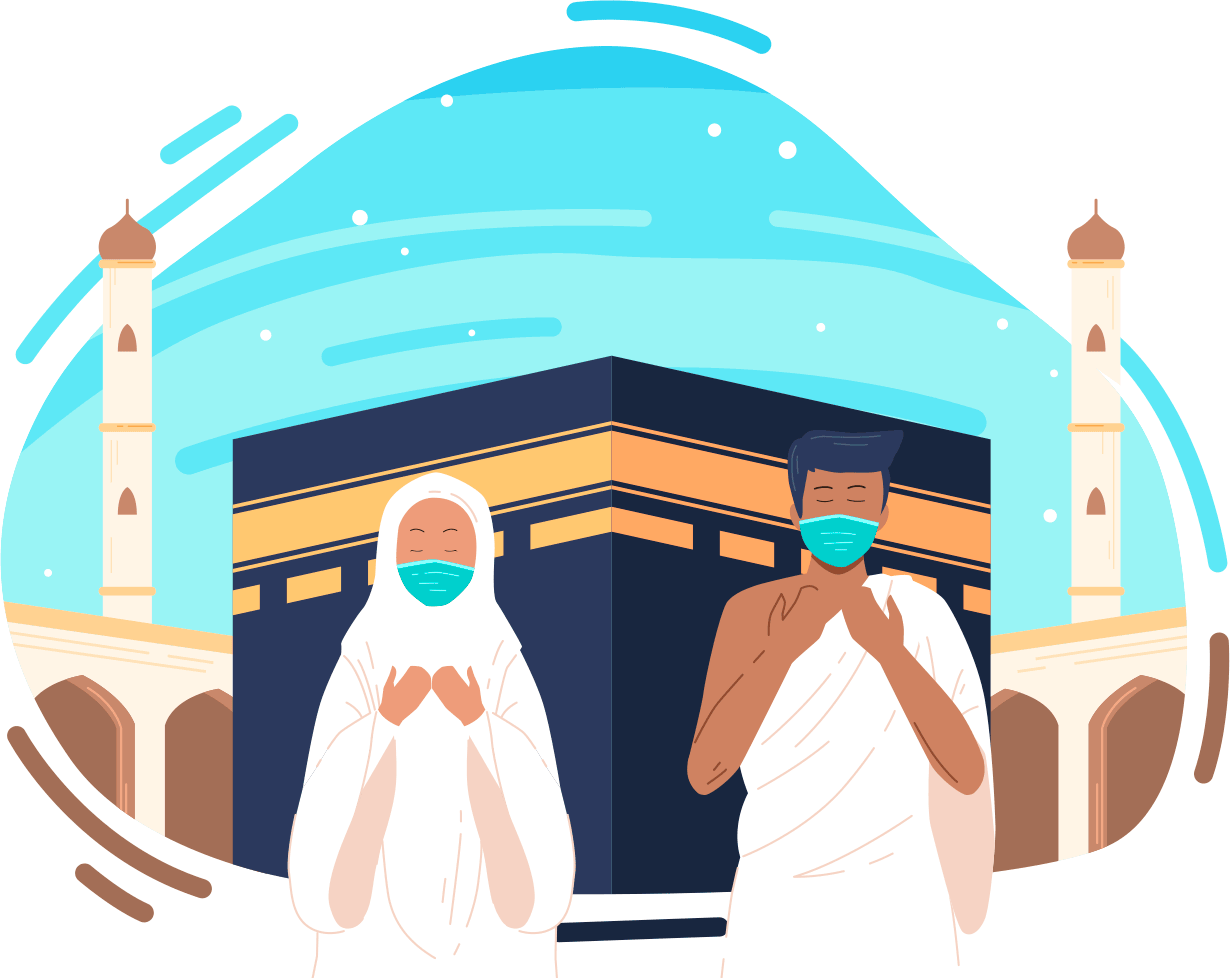 That pilgrims maintain good hygiene practices, take precautions to prevent illness and seek prompt medical attention if needed.
That pilgrims maintain good hygiene practices, take precautions to prevent illness and seek prompt medical attention if needed.
» Communication objectives
To ensure pilgrims:
are aware of how infections can spread during Umrah and Hajj;
know how to prevent common illnesses; and
understand the importance of seeking timely medical care.
» Key message
Protect your health and prevent the spread of illness during your pilgrimage by practicing good hygiene, taking precautions to avoid illness and seeking medical attention if you feel unwell.
» Supporting messages
How can you prevent respiratory infections?
Respiratory infections can easily spread in crowded settings. To protect yourself and others:
wash your hands frequently with soap and water or use a hand sanitizer, especially after coughing or sneezing and before eating;
use disposable tissues when coughing or sneezing and dispose of used tissues in a wastebasket;
wear a regular face mask, especially in crowded places;
avoid close contact with people who appear ill and refrain from sharing their personal belongings;
cover your mouth and nose when you cough or sneeze;
do not share personal items like cups, water bottles or eating utensils and avoid overcrowded areas whenever possible; and
avoid contact with camels in farms, markets or barns.
How can you prevent food and waterborne diseases?
To reduce the risk of food and waterborne diseases during mass gatherings, follow these guidelines:
wash your hands before and after eating and after using toilets, before handling food and after touching animals;
thoroughly clean and wash fresh vegetables and fruit;
cook food thoroughly and store it at safe temperatures;
keep raw and cooked food separated; and
avoid drinking unpasteurized milk or eating animal products that have not been thoroughly cooked.
How can you prevent heat-related conditions and dehydration?
To avoid heat-related illnesses and dehydration, which can be common during the pilgrimage:
avoid direct sun exposure while performing rituals;
drink consistently throughout the day, even if you do not feel thirsty, and increase your intake in hot weather, during physical exertion or if you experience symptoms of dehydration;
recognize the symptoms of dehydration, including extreme thirst, dry mouth and skin, dark urine, dizziness and fatigue;
if you experience symptoms of dehydration, seek rest in a cool place, drink water or an oral rehydration solution immediately and seek medical attention if symptoms persist or worsen; and
consult your doctor about possible adjustments if you take medications that can exacerbate dehydration (such as diuretics) or interfere with your body’s ability to regulate temperature (heat exchange).
How can you prevent vector-borne diseases?
To avoid mosquito bites which can transmit diseases like Zika virus and dengue fever:
wear protective clothing (preferably light-coloured) that covers as much of the body as possible;
use physical barriers such as window screens and closed doors; and
apply insect repellent (as per label instructions on the product) to skin or clothing. Look for products with DEET (a common and effective insecticide ingredient), IR3535 (another effective and milder ingredient) or Icaridin (generally well tolerated) as the active ingredient.
How should you manage your chronic condition during the pilgrimage?
If you have a chronic medical condition, carry documentation detailing your condition and adequate supplies of medication in their original packaging at all times during your pilgrimage. Seek immediate medical attention if your condition worsens.
What should you do if you feel unwell?
If you experience any symptoms of illness, seek medical attention promptly at a health care facility. Inform the health care provider of any chronic medical conditions you have. Do not delay seeking care. Early diagnosis and treatment are crucial for your health and to prevent the spread of illness to others.
Messages for travellers: post-travel
» Target behaviour
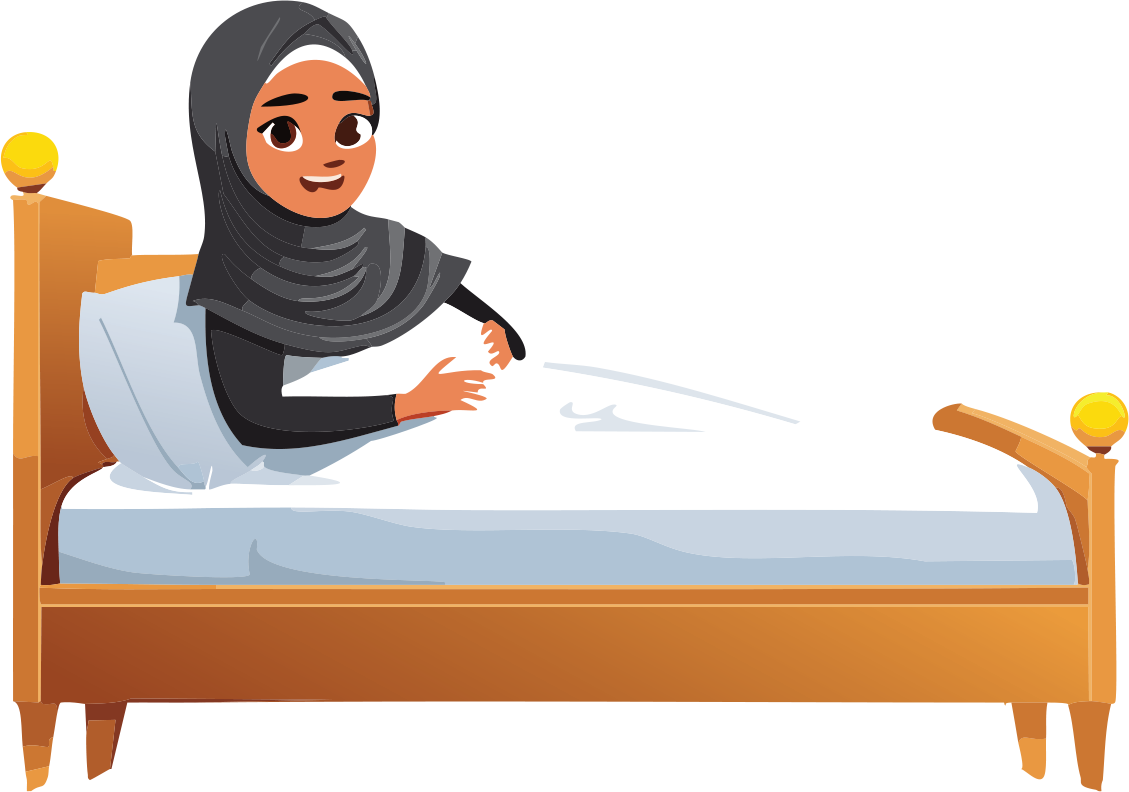 That travellers remain vigilant for symptoms of illness after returning home, seek prompt medical attention if symptoms develop and inform their doctor about their recent travel to Umrah or Hajj.
That travellers remain vigilant for symptoms of illness after returning home, seek prompt medical attention if symptoms develop and inform their doctor about their recent travel to Umrah or Hajj.
» Communication objectives
To ensure travellers:
understand that some illnesses can manifest after returning home;
know what symptoms to look out for; and
recognize the importance of informing their doctor about their recent travel history.
» Key message
After returning from Umrah or Hajj, monitor your health for any symptoms of illness and if you feel unwell, seek medical attention and inform your doctor of your recent travel history.
» Supporting messages
Why is it important to monitor your health after returning home?
The incubation period (the time between infection and the onset of symptoms) for some diseases can be several days or even weeks. This means you may have been exposed during your pilgrimage but not develop symptoms until after you have returned home.
What symptoms should you watch for?
Be vigilant for any signs of illness, which can appear from a few days to up to two weeks after exposure. Symptoms can vary but may include:
fever, which can be high (e.g. 40°C/104°F);
headache, including severe headache or pain behind the eyes;
muscle and joint pains;
fatigue or tiredness, which can be severe;
respiratory symptoms, such as cough or shortness of breath;
gastrointestinal issues, including nausea, vomiting, abdominal pain and diarrhoea;
skin rash;
swollen glands;
sore throat;
sore eyes;
dizziness;
numbness or tingling;
loss or change to sense of taste or smell; and
difficulty sleeping.
Seek immediate medical attention if you experience any of the following severe symptoms:
difficulty breathing, especially at rest;
inability to speak in sentences;
confusion, drowsiness or loss of consciousness;
persistent pain or pressure in the chest;
cold, clammy, pale or bluish skin;
loss of speech or movement;
severe abdominal pain;
persistent vomiting;
rapid breathing;
bleeding gums or nose; and
blood in vomit or stool.
Remember that some people, especially those with pre-existing health conditions, are at higher risk of developing severe illness. It is important to seek medical help early if you are worried about your condition.
Even after recovery, some people may experience long-lasting effects, such as fatigue, breathlessness and cognitive dysfunction. If you experience such symptoms, consult your doctor.
What should you do if you develop symptoms after returning home?
If you develop any concerning symptoms, seek medical attention promptly. Early diagnosis and treatment can help prevent severe illness and potential long-term complications or disability.
Inform your doctor about your recent travel to Umrah or Hajj, including the dates and locations you visited. This information helps your doctor in the diagnostic process.
How can you prevent spreading illness to others after your trip?
Because some illnesses can be contagious, take precautions to protect your family and community upon your return.
If you develop any symptoms, limit close contact with others, especially vulnerable individuals such as the elderly, young children and those with weakened immune systems.
Follow your doctor's advice regarding isolation and quarantine measures.
Where can you get more information?
For the most up-to-date information on health requirements and recommendations for travel to Saudi Arabia, please visit the official website of the Saudi Ministry of Health (www.moh.gov.sa).
Resources and additional information
Coronavirus disease (COVID-19) key facts. Geneva: World Health Organization; 2023.
Dengue and severe dengue key facts. Geneva: World Health Organization; 2024.
Meningitis key facts. Geneva: World Health Organization; 2023.
Poliomyelitis key facts. Geneva: World Health Organization; 2025
Yellow fever key facts. Geneva: World Health Organization; 2023
Zika virus key facts. Geneva: World Health Organization; 2022.




